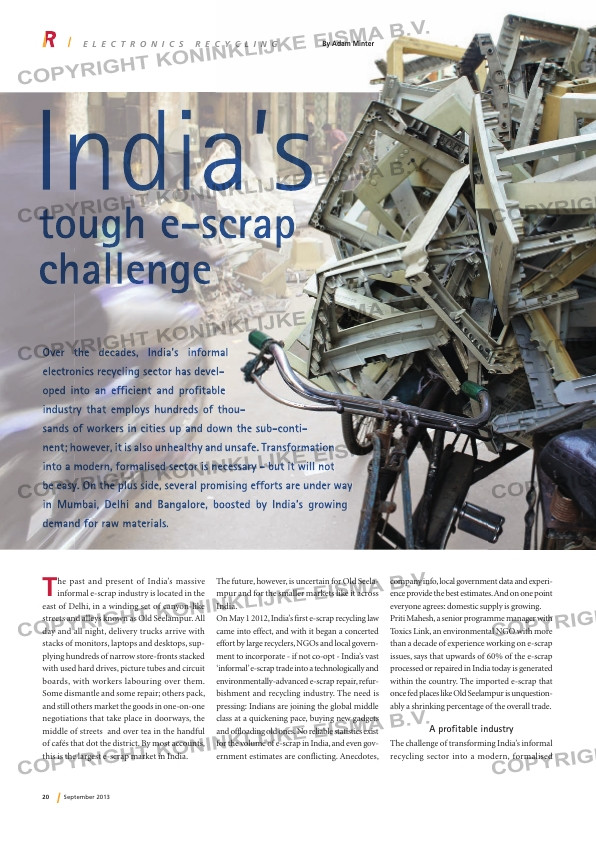Page 20 from: September 2013

20 September 2013
The past and present of India’s massive informal e-scrap industry is located in the
east of Delhi, in a winding set of canyon-like
streets and alleys known as Old Seelampur. All
day and all night, delivery trucks arrive with
stacks of monitors, laptops and desktops, sup-
plying hundreds of narrow store-fronts stacked
with used hard drives, picture tubes and circuit
boards, with workers labouring over them.
Some dismantle and some repair; others pack,
and still others market the goods in one-on-one
negotiations that take place in doorways, the
middle of streets and over tea in the handful
of cafés that dot the district. By most accounts,
this is the largest e-scrap market in India.
The future, however, is uncertain for Old Seela-
mpur and for the smaller markets like it across
India.
On May 1 2012, India’s first e-scrap recycling law
came into effect, and with it began a concerted
effort by large recyclers, NGOs and local govern-
ment to incorporate – if not co-opt – India’s vast
‘informal’ e-scrap trade into a technologically and
environmentally-advanced e-scrap repair, refur-
bishment and recycling industry. The need is
pressing: Indians are joining the global middle
class at a quickening pace, buying new gadgets
and offloading old ones. No reliable statistics exist
for the volume of e-scrap in India, and even gov-
ernment estimates are conflicting. Anecdotes,
company info, local government data and experi-
ence provide the best estimates. And on one point
everyone agrees: domestic supply is growing.
Priti Mahesh, a senior programme manager with
Toxics Link, an environmental NGO with more
than a decade of experience working on e-scrap
issues, says that upwards of 60% of the e-scrap
processed or repaired in India today is generated
within the country. The imported e-scrap that
once fed places like Old Seelampur is unquestion-
ably a shrinking percentage of the overall trade.
A profitable industry
The challenge of transforming India’s informal
recycling sector into a modern, formalised
tough e-scrap
challenge
E l E c t r o n i c s r E c y c l i n g By Adam Minter
India’s
Over the decades, India’s informal
electronics recycling sector has devel-
oped into an efficient and profitable
industry that employs hundreds of thou-
sands of workers in cities up and down the sub-conti-
nent; however, it is also unhealthy and unsafe. Transformation
into a modern, formalised sector is necessary – but it will not
be easy. On the plus side, several promising efforts are under way
in Mumbai, Delhi and Bangalore, boosted by India’s growing
demand for raw materials.
p20_E-scrap in India.indd 20 03-09-13 09:38



